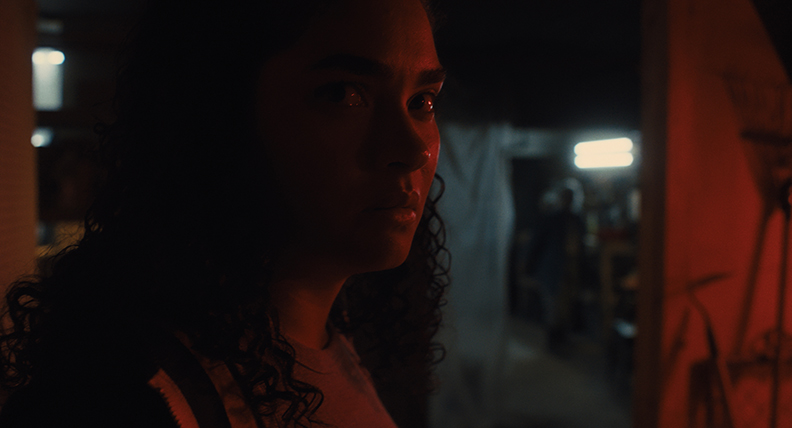
A Confession Built From Coverage
In Our Blood
MOVIE REVIEW
In Our Blood
-
Genre: Psychological Thriller, Horror, Mystery
Year Released: 2025
Runtime: 1h 28m
Director(s): Pedro Kos
Writer(s): Mallory Westfall, Aaron Kogan, Steven M. Klein, Clay Tweel
Cast: Brittany O’Grady, E. J. Bonilla, Alanna Ubach, Krisha Fairchild, Leo Marks, Bianca Comparato, Steven Klein
Where to Watch: releasing theatrically nationwide October 24, 2025
RAVING REVIEW: IN OUR BLOOD is the kind of horror-adjacent thriller that creeps up on you while insisting it’s only documenting what’s already there. Framed through a documentary style lens—literally, via a cinematographer’s camera and a filmmaker’s phone—the story follows Emily, a director attempting to reconcile with her estranged mother while shooting the process. When the mother vanishes, the film pivots from intimate vérité to a progressively unnerving investigation, testing how far film-making can go before it becomes complicity. The premise isn’t just clever; it weaponizes point of view to turn everyday coverage into an ethical minefield.
Pedro Kos, making a narrative debut after acclaimed documentary work, brings a documentarian’s instinct for presence: the patience to hold on faces; the nerve to trust silence; the reflex to observe rather than explain. That choice gives the film a tactile authenticity that grounds the escalating dread. The realism matters here because the movie’s core is perspective: what the camera captures and what the frame edits out. When the story darkens, it feels less like a genre switch and more like a realization that we’ve been in the genre all along, just pretending we weren’t.
Brittany O’Grady is the film’s emotional live wire. She calibrates Emily’s on-camera purposefulness against private doubt, letting flickers of guilt and defiance complicate the “daughter seeking closure” narrative. You can read the project’s ambition in her posture and hear its cracks in her voice. E. J. Bonilla, operating both as character and proxy camera, modulates performance with a restraint that complements the format; he’s the presence that keeps shots anchored when the story drifts toward the bizarre. Alanna Ubach and Krisha Fairchild give the film its lived-in ache—performances that carry histories in the margins. The ensemble, crucially, plays the reality without quotation marks.
Formally, the film is specific about how images are sourced: handheld documentary coverage, iPhone intimacy, and observational passages all collide to build a layered subjectivity. That design supports one of the movie’s strongest through-lines—how art and evidence can be indistinguishable when the people behind the lens are also inside the story. The editing leans on longer takes and fragments, creating an investigative tempo that privileges discovery over exposition. When the film tightens its grip, the shift is earned; tension comes from piecing together what the frame refuses to make easy.
The movie understands how found-footage and faux-documentary storytelling can be more than a delivery system for jump scares—it can interrogate why we’re watching and what it costs to look. Kos and his team stage small, telling details: a door left ajar just out of focus; a subject who angles their body slightly away from the lens; a question asked twice because the first answer was too “perfect.” Those aspects aren’t ornamental; they’re the depth of doubt. And as the clues accrue, the film keeps the camera honest to its premise—rare for this subgenre, which often breaks its own rules when the suspense ratchets up.
Performance-wise, O’Grady carries the movie. She doesn’t chase a capital-M monologue; she lets the character’s contradictions breathe. Her rapport with Bonilla adds dimension to the central relationship, shaded by trust, fatigue, and the professional shorthand of collaborators who need each other to make sense of what they’re seeing. Fairchild brings soulfulness to a role that could have read as an archetype elsewhere, and Ubach finds notes that complicate any easy read of maternal absence.
In terms of craft, the camera choices avoid fetishizing decay or poverty, a trap many “issue-adjacent” thrillers focus on. Instead, locations are observed with curiosity and respect, aligning with the film’s stated aim: to center vulnerable lives without reducing them to spectacle. Sound design leans into environmental rather than cue-heavy telegraphing, so when a musical element pushes forward, it registers as escalation rather than instruction.
Where the film could push further is in its post-reveal aftermath. The final movement asserts a position—about accountability, about the predatory tendencies of both systems and storytellers—but it resolves so quickly. A moment that allowed the consequences to breathe might have transformed a strong statement into a lingering indictment. As is, the movie lands with a clean sting, thematically resonant but just shy of devastating.
IN OUR BLOOD succeeds as a morally inquisitive thriller that respects its audience. It uses documentary tools to question documentary, all while delivering a missing-person mystery that grows more disturbing the more it implicates the camera. For viewers tired of found-footage cheats and format-breaking conveniences, this is a welcome change—sincere about its world, serious about its people, and transparent about the risks of turning pain into narrative.
Please visit https://linktr.ee/overlyhonestr for more reviews.
You can follow me on Letterboxd, Instagram, Twitter, and YouTube. My social media accounts can also be found on most platforms by searching for 'Overly Honest Reviews'.
I’m always happy to hear from my readers; please don't hesitate to say hello or send me any questions about movies.
[photo courtesy of UTOPIA]
DISCLAIMER:
At Overly Honest Movie Reviews, we value honesty and transparency. Occasionally, we receive complimentary items for review, including DVDs, Blu-rays, CDs, Vinyl Records, Books, and more. We assure you that these arrangements do not influence our reviews, as we are committed to providing unbiased and sincere evaluations. We aim to help you make informed entertainment choices regardless of our relationship with distributors or producers.
Amazon Affiliate Links:
Additionally, this site contains Amazon affiliate links. If you purchase through these links, we may receive a commission. This affiliate arrangement does not affect our commitment to honest reviews and helps support our site. We appreciate your trust and support in navigating these links.